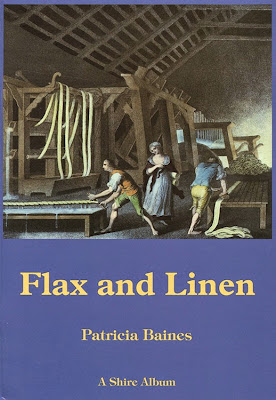The fist softback book of around 120 pages is in pristine condition and is a wonderful testament to the thriving silk trade of Macclesfield (in the north west of England on the edge of The Peak District.)
Using mostly old photographs it documents the lives of those involved in the manufacture of silk - spinners, weavers, dyers, designers, mill owners - how they worked and lived and where they went to school. I cannot recommend it to you enough. Look at the image of the small child in the top right photo below working the machines - and this is within photographic history...
This second book is also in pristine condition. Softback with around 120 pages, it focuses on the manufacture of linen from flax in the north west of England.
There is also a chapter on the revival of linen making and linen reticella lace - called Ruskin Lace
- in the Lake District.
The third book is also in excellent condition. Its 2 dozen pages document textile weaving and manufacture in Leeds, in the West Riding of Yorkshire.
The Leeds Bradford textile belt was a great and thriving industry until my early twenties. Just about everyone I knew as a child worked in the textile business. The mills themselves were designed to resemble Italian palaces and to last for another millennium at least.......
This shire book softback book of 32 is in pristine condition and documents the history ands manufacture of linen from flax in all its processes.
What I found fascinating in this book was the history of Flemish damask cloths
and their portrayal of biblical scenes - were they patterns for some of the Stuart panels not founded on book illustration?
These last two books are also interesting. They are vintage used books. East Riddlesden Hall can be found near Keighley in West Yorkshire and is home to some rather gorgeous Stuart panels.
The last book is a monograph on the embroideries at Durham Cathedral. It is around 26 pages in length and is softback.
This book is important as it is the most accessible source for Anglo Saxon embroideries. Yes, indeed! The fabulous embroideries found in St Cuthbert's tomb at Durham date to the early 900s.













No comments:
Post a Comment